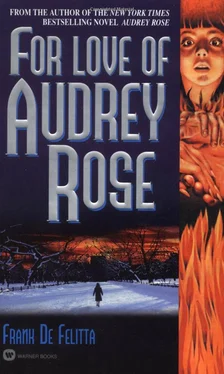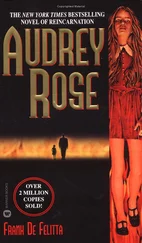“Five.”
Janice nearly gasped in shock. For an instant she did not know who spoke. Then Jennie sat up, stared blankly at her.
“Five-four-two.”
Janice, trembling, went to the bathroom and brought Jennie a glass of water. The girl drank greedily and hiccupped lightly. Janice kissed her forehead.
Slowly Jennie’s eyes closed, the glassy, cool stare of sleep disappeared under the soft lids. The tiny lips curled around a word, like releasing bubbles, and a tiny aspiration made a sound: “Four.”
What a peculiar malady, Janice reflected. A child makes an analogue of language, but not language itself. What, if anything, did Jennie speak of now, in her unimaginable dreams?
The following morning Janice cut bananas into cereal for Jennie, poured milk into the bowl, and made a ring of strawberries on top. Then she heard faint sounds overhead. They were light, delicate sounds, unlike Ivy in her terror. Jennie peered uncertainly down from the top of the stairs. A shy smile spread over the elfin face.
“Come on down, darling,” Janice called.
But Jennie recoiled into Ivy’s room. Janice ran upstairs, found the girl hiding under the cot, quickly dressed her, and carried her down to breakfast. Jennie had a fabulous appetite. Her metabolic rate must be high, Janice thought, to keep her so thin.
That morning, Janice braved the department stores with Jennie. A jumper in green, two pairs of jeans, four shirts, numerous underclothes, and a dress found their way back to Des Artistes. Then Jennie, exhausted, teetered over to Janice and fell, half asleep, against her breast.
So it was nothing freakish, Janice thought. Jennie’s collapse on Bill was just a lucky piece of timing. Janice, much relieved, took her upstairs to the cot for a nap, and worked through the afternoon on an assignment she and Elaine had decided could just as well be done at home.
Jennie was popular with the hospital staff. She had a sly sense of humor. She metamorphosed paper clips, file folders, and pencils into objects of ritual, forming semicircles composed of prime numbers. Psychiatrists tried to catch her at subtraction, but she only added, multiplied and divided. No one knew why. But she never made a mistake.
By early autumn, she knew the way to Bill’s room. She walked in front of Dr. Geddes, avoiding the swirls printed in the tiled floor.
Bill rose eagerly on the mornings of Jennie’s visits. He shaved, wore his best clothes, and paced the floor nervously. An inner love glowed from his eyes. He ignored Janice, but found delight in every action, every sound from Jennie. He became irritated at Dr. Geddes and Janice, jealous of their time with the child.
“This awareness of the child,” Dr. Geddes confided as they left. “It’s a real relationship. The first step to social reintegration.”
In fact, to preserve his meetings with Jennie, Bill controlled his every act. He tried never to be suspicious, never angry, amenable to any test Dr. Geddes proposed. He learned to mimic the easy pleasantries of men shaking hands and discussing the weather. He read the newspaper, forced himself to discuss things with other patients, until he was certain he could speak without hesitation.
By the end of autumn he had purchased, with Janice’s help, a small library of books for Jennie.
“Do you remember, Ivy?” he whispered into Jennie’s ear, seating her on his lap. “You loved this one.”
He read through an entire fable of the hippopotamus that worked for a baker, and barely suppressed his anger when Jennie made no response.
“Soon, darling… soon…” Bill whispered, kissing her behind the ear.
Bill bought toys, the toys that Ivy had loved, and was mystified that Jennie went dead when brought before them. He bought a red plastic phonograph and yellow records that played tinkling chimes of folk songs, but Jennie appeared to be deaf. Bill drew pictures of the pumpkins Ivy loved more than anything in those bright autumn days upstate, but Jennie clumsily stepped on the crayons and tore the pictures into shreds.
In the evenings, Bill sat by the edge of the bed, brooding in the darkness, steeling himself for patience, ever more patience.
Autumn died suddenly. The trees were bleak. The frigid winds piled detritus of the seasons in doors, grates, and alleys.
It was not until the first snow fell that Bill truly divined the mystery of autism. In the midst of tramping a path through the hospital grounds — a field of glistening white— with Dr. Geddes and two orderlies watching, he stopped. Instead of following, instead of playing the game, Jennie collapsed in the snow. A soft white spray glittered upward in the sun. Bill knelt at her side. Gently he brushed the snow from the tiny face.
“You don’t understand anything, do you?” he murmured.
“No one knows,” Dr. Geddes said, hunching down next to the girl. “Some say the child refuses to be aware, but has the capacity.”
“Well, I used to be locked up, too. You just have to find the key all by yourself.”
Pleased, Dr. Geddes reported to Dr. Boltin that Bill felt compassion for the girl, and understanding of another’s suffering. He added that Bill had inquired about adoption.
Dr. Boltin chuckled. “Not very likely, I should imagine.”
“Perhaps not, but don’t you see? He’s suddenly taken a look into the future. He feels the coherence within himself. So he can plan for tomorrow.”
At the beginning of December, Jennie caught a cold. The fever persisted, the symptoms lasted weeks. A physician recommended bed rest. Bottles of pills, cups of orange juice, a thermometer, and several toys collected at the side of the cot. Jennie’s eyes grew dazed, her arms weak.
Bill fought against despondency. He was hooked on Jennie’s visits. Pretend as he might, the desolation closed in tighter and tighter as the month dragged wearily on toward Christmas.
Bill purchased seven boxes of crepe paper, five of ornaments. He and three other patients strung them across the cafeteria and along the hall leading to Bill’s room. In the room itself, Bill put up the most elaborate white angels, gold stars, and glittering balls. He persuaded the nurse to bring him branches of pine trees from the edge of the hospital grounds and these he decorated with hoops of colored paper.
Dr. Geddes walked in, amazed at the frenetic activity.
“Bill. You’re putting on a Christmas pageant.”
Bill turned, eyes red but dry.
“Yes,” he said hoarsely. “For Ivy, even though I know she can’t be here. Isn’t it the strangest thing? A few months ago I’d never seen her, and now…”
Dr. Geddes stepped closer.
“This relationship is a stepping-stone, Bill. You are quite right to cherish it.”
Overcome, Bill grabbed Dr. Geddes’s hand. He squeezed hard.
“Thank you, Dr. Geddes,” he whispered. “For everything you’ve done.”
“Bill, I just — Well, I guess I just hope for the same things you do.”
Bill nodded; then, to break the impasse, moved away. He sadly fingered the twirled crepe paper that arched along the window.
“How is she?”
“Getting better, Bill.”
“Won’t be here for Christmas?”
“No.”
“What about New Year’s?”
“Maybe. I doubt it.”
“Well, there’s always her birthday.”
Dr. Geddes smiled quickly. “Really? When is her birthday?”
“February third. Ten forty-three in the morning.”
“That’s right, the birth certificate.”
“I called the Hall of Records in Pittsburgh.”
“And?”
“Her certificate’s there, all right. Guess I was wrong.”
Dr. Geddes chuckled pleasantly. “Now, when you’re through in here, I’d like you to come down to my office.”
“Oh? Why?”
Читать дальше












